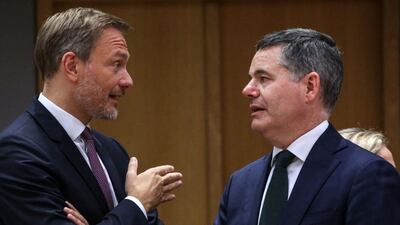European Union officials on Monday said that the bloc's economy could contract this winter amid increased spending to ward off the effects of a severe energy crisis caused by the war in Ukraine and soaring inflation.
“The economy is slowing down and contraction is coming for at least the winter months,” European Economy Commissioner Paolo Gentiloni told reporters before a meeting of eurozone finance ministers in Brussels.
Inflation in the euro area has climbed to 10.7 per cent, he later said at a press conference.
Chief economist at the European Stability Mechanism Rolf Strauch warned of “a risk of a recession”, saying financial markets are concerned about the eurozone’s ability to bring down inflation on the one hand and sustain growth on the other.
Eurozone countries have spent about €200 billion, or 1.25 per cent of eurozone gross domestic product, to mitigate the impact of the energy crisis and support vulnerable households and businesses.
But such fiscal expansion also adds to inflationary pressures.
The commission recommends targeted support packages instead of broad-based fiscal stimulus. So far, only 30 per cent of measures taken by member states this year have been targeted.
“I think we can make further progress despite the fact that we are aware that targeting is not always easy politically and technically, especially if you have to react quickly,” said Mr Gentiloni, who added that targeting “could improve in the coming months”.
Ireland’s Finance Minister Paschal Donohoe — who heads the group of eurozone finance ministers, or Eurogroup — said that the latest figure for growth in 2023 in the euro area is at 0.5 per cent. It was at 2.7 per cent before Russia’s invasion of Ukraine in February of this year.
The commission on Friday will present its autumn economic forecast which will confirm the weakening of Europe’s economy and continued high inflation, said Commission Executive Vice President Valdis Dombrovskis.
“We hope that inflation will go on a downwards path because energy prices have peaked,” he said.
Europe’s high energy costs have reduced the competitiveness of European companies, and the finance ministers said they feared that the recent US stimulus package — the Inflation Reduction Act — would further harm industry.
The Inflation Reduction Act will involve vast spending on green energy initiatives and include tax breaks for buying US-made electric cars and batteries.
Speaking as he arrived to the Eurogroup meeting, French Economy Minister Bruno Le Maire lambasted the US policy, saying that the massive subsidies were harming competition laws.
“We are under double pressure,” said Mr Le Maire.
“On one side, you have all the subsidies that might be provided by American companies on the US soil. On the other side, you have the fact that the energy prices in Europe are far more expensive than the ones you have in the US.
“This double effect could be very detrimental for the European industry.”
In an interview with several European media outlets published on Friday, Mr Le Maire said he has not ruled out making a complaint to the World Trade Organisation over the issue.
Germany’s Finance Minister Christian Lindner echoed Mr Le Maire’s concerns and said it might be time to consider a new transatlantic free trade agreement.
“We have to inform the US side about our serious concerns,” he said.
German Chancellor Olaf Scholz said last month that the US measures could trigger “a huge tariff war”.


